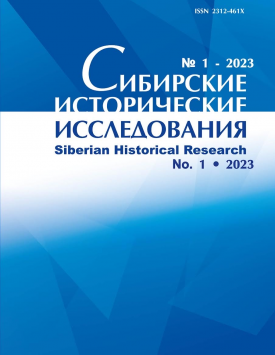“To Orient Without Predicting”: The Future in P. Stearns’ Social History
The authors consider an approach to the study of connections between the past and the future in the series of Peter Stearns' works on social history. Despite the concreteness (and sometimes seemingly “applied” character) of Stearns' research, the conceptualization of images of the future plays an important role in his texts, helping to emphasize the problem of uncertainty that is central to modern society. The problem, in Stearns' opinion, correlates definitely with changes in the sphere of social demography, new discourses of education and consumerism, but also with trends towards the fragmentation and internalization of time at the current stage of globalization. In regard to working with various future scenarios, Stearns's position seems to be skeptical: in reality, social history deals with competing trends, the permanent “ramification” of which makes its predictive functions unlikely. Simultaneously, according to Stearns, a historically sensitive approach to the topic is able to orient society in a certain degree, outlining variants of developments and revealing groups of interests hidden behind one or another future scenario. It is extremely important in this context to save the balance between the academic correctness of research and the interest in it from the wide public. A full-fledged dialogue with the latter makes it possible to disavow partly the manipulative strategies of the social elites.
Keywords
social history,
Peter Stearns,
temporality,
future scenarios,
uncertaintyAuthors
| Nikolai Feodor V. | Lobachevsky State University of Nizhny Novgorod; Minin Nizhny Novgorod State Pedagogical University | fvnik@list.ru |
| Maslov Artem N. | Lobachevsky State University of Nizhny Novgorod | maslovartem@yandex.ru |
Всего: 2
References
Веселые человечки: культурные герои советского детства / под ред. И. Кукулина, М. Липовецкого, М. Майофис. М.: Новое литературное обозрение, 2008.
Зверева Г.И., Репина Л.П. Социальная история и "новая историческая наука" в Великобритании // Новая и новейшая история. 1988. № 4. С. 159-174.
Ионов И.Н. Связанная история: между двойной связкой и отрицательной обратной связью // Диалог со временем. 2014. Вып. 46. С. 194-218.
Козеллек Р. "Пространство опыта" и "горизонт ожиданий" - две социологические категории. Методические замечания / пер. с нем. А. Котова, О. Кильдюшова; под ред. А. Смолькина, И. Напреенко // Социология власти. 2016. № 2. С. 149-173.
Липовецкий М., Михайлова Т. Больше, чем ностальгия (поздний социализм в сериалах 2010-х годов) // Новое литературное обозрение. 2021. № 3. С. 127-147.
Николаи Ф.В., Кобылин И.И. Выиграть время, или темпоральные (за)стенки неолиберального капитализма // Социология власти. 2021. № 1 (33). С. 84-102.
Олейников А.А. Время истории // Логос. 2021. № 4. С. 5-30.
Репина Л.П. Социальная история и историческая антропология: новейшие тенденции в британской и американской медиевистике // Одиссей: Человек в истории. 1990. М.: Наука, 1990. С. 167-181.
Репина Л.П. Социальная история в историографии ХХ столетия. Курс лекций. М.: ИВИ РАН, 2001.
Штрик В. Купленное время. Отсроченный кризис демократического капитализма / пер. с нем. И. Женина. М.: Издательский дом ВШЭ, 2019.
Brown W. Undoing the Demos: Neoliberalism's Stealth Revolution. N.Y.: Zone Books, 2017. Jansen H. Hidden in Historicism. Time Regimes since 1700. N.Y.; L.: Routledge, 2020.
Kalinina Е. Mediated Post-Soviet Nostalgia. Stockholm: Sodertorns hogskola, 2014. Koselleck R. Die unbekannte Zukunft und die Kunst der Prognose // Koselleck R.
Zeitschichten: Studien zur Historik. Mit einem Beitrag von Hans-Georg Gadamer. Frankfurt am Main: Suhrkamp, 2000. S. 203-223.
Koselleck R. The Unknown Future and the Art of Prognosis / transl. by T. Pressner // Koselleck R. The Practice of Conceptual History: Timing History, Spacing Concepts. Stanford: Stanford University Press, 2002. P. 131-147.
Post-Soviet Nostalgia: Confronting the Empires Legacies / ed. by O. Boele, B. Noordenbos, K. Robbe. N.Y.; L.: Routledge, 2020.
Simon Z.B., Tamm M. Historical Futures // History and Theory. 2021. Vol. 60. No. 1. P. 3-22.
Stearns P.N. Cleo contra Cassandra // The History Teacher. 1977. Vol. 11. No. 1. P. 7-28.
Stearns P.N. Forecasting the Future: Historical Analogies and Technological Determinism // The Public Historian. 1983. Vol. 5. No. 3. P. 31-54.
Stearns P.N. The Idea of Postindustrial Society: Some Problems // Journal of Social History. 1984. Vol. 17. No. 4. Р. 685-693.
Stearns P.N. Social History Update: Sociology of Emotion // Journal of Social History. 1989. Vol. 22, No. 3. Р. 592-599.
Stearns P.N. Anxious Parents: A History of Modern Childrearing in America. N.Y.; L.: New York University Press, 2003a.
Stearns P.N. Social History Present and Future // Journal of Social History. 2003b. Vol. 37. No. 1. Р. 9-19.
Stearns P.N. American Fear: The Causes and Consequences of High Anxiety. N.Y.; L.: Routledge, 2006a.
Stearns P.N. Childhood in World History. N.Y.; L.: Routledge, 2006b.
Stearns P.N. Consumerism in World History: The Global Transformation of Desire. N.Y.; L.: Routledge, 2006c.
Stearns P.N. Gender in World History. N.Y.; L.: Routledge, 2015.
Stearns P.N. Time in World History. N.Y.; L.: Routledge, 2019.
Stearns P.N., Tarr J.A. Curriculum in Applied History: Toward the Future // The Public Historian. 1987. Vol. 9. No. 3. Р. 111-125.

